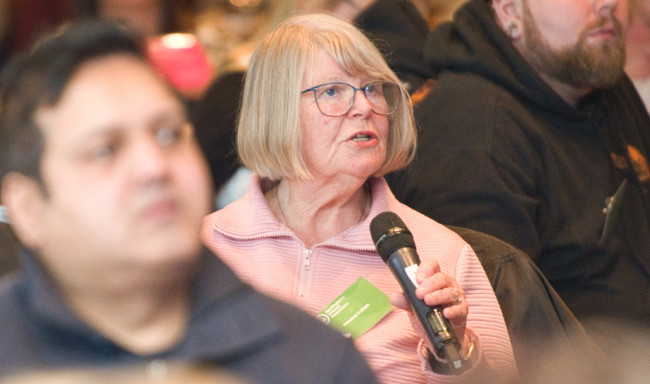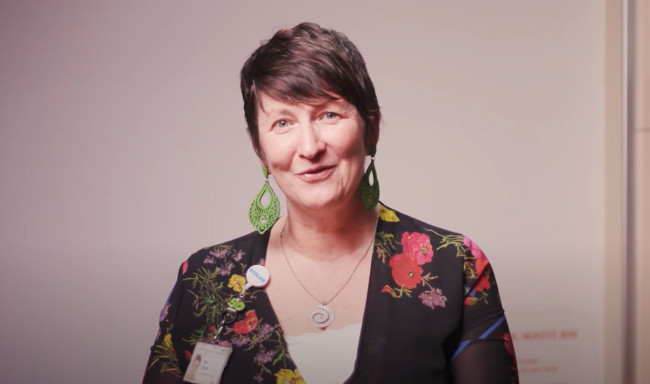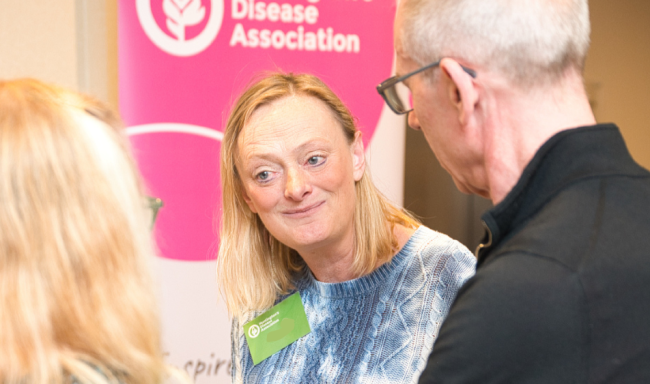Gemma waited ten years before she decided to go through predictive testing.
Genetic testing is one of the biggest decisions someone at risk of Huntington's will have to make. The age you can take a predictive test for Huntington's disease is 18 but that doesn't mean that is the right time for everyone. We spoke to Gemma about why she waited and when she felt the time was right for her.
At what point in your life did you feel ready to take a genetic test?
"I'm 29 and I went through genetic testing for Huntington’s disease in 2022. I discovered that I had inherited the faulty gene that causes Huntington's disease from my mum, with a CAG of 45. My mum was diagnosed with Huntington's disease when I was 15, and it took over a decade before I finally made the decision to get tested myself. I spent all of those years feeling totally certain that I had the faulty gene that causes Huntington's disease."
There were a few reasons why it took me over a decade to get tested. I never felt the timing was right, but I also found deep reassurance from trying not to think about the inevitable.
"For the first six years after Mum’s diagnosis, I found it overwhelming trying to juggle caring for Mum with navigating education and managing my own health struggles. But even after my mum moved into a care home in 2017, I still couldn’t face having any form of genetic counselling. Avoidance can be a survival technique. I believed that I was going to develop Huntington's disease, but I didn’t want it confirmed. Because being at 50:50 risk gave me a tiny glimmer of hope, even if I didn’t really believe it was going to come true. And that tiny glimmer of hope is a very powerful thing."
"Initially, I found hope in the uncertainty. But there came a point where the uncertainty started to eat away at me, and I realised that I couldn’t continue to delay the decision. Doubt started to creep into my mind, and I had a turning point in my thinking. Rather than telling myself “I’ll never get tested for Huntington's disease”, I started to get curious. I asked myself “what would happen if I did get tested for Huntington's disease?” and “what would be the benefits of finding out?”. During the pandemic I had a lot of time on my hands to think about it all, and I started to feel really anxious about the future. With the help of therapy, I realised that the harder I tried to push away those thoughts about my own genetics, the louder they were shouting at me. And while I used to tell everyone that I wanted to push Huntington's disease to the back of my mind and crack on with my life, I wasn’t really living my life at all. In fact, I had put everything on hold because I had been assuming that I wasn’t going to live a long life. I was pushing people away and avoiding long-term commitments, relationships, and decisions about my future."
"I felt like I was trapped between a rock and a hard place. Rationally, I knew that it was time to get tested, but it still felt like an impossible dilemma. Nobody wants to find themselves in a situation where all the possible outcomes (testing positive, testing negative, not testing at all, or having an intermediate result) are all so unbelievably rubbish for different reasons. Genetic testing feels like playing a lottery where all of the options you could win are life-altering. And having genetic testing doesn’t mean that you never have to think about Huntington's disease again, because regardless of your result, Huntington's disease is going to remain a huge part of your life. Every single person in the world has difficulties to overcome on a daily basis, but it can feel like we are often handed more challenges than most"
For me personally, I don’t think there was ever going to be such thing as the “perfect” time to go through the testing process. I’m sure that most people in the Huntington's disease community can relate when I say that my life is more than a little turbulent even on the best day imaginable! So when we’re faced with this decision, we can only make the best judgement call that we can based on what feels right for us at the time. And I genuinely felt like the timing was right for me.
How did you find the counselling and testing process?
"As I was walking towards my car after my first genetics appointment, I knew that testing was the only path forward for me. I was completely overwhelmed by certainty about my decision to test. It was such a strong emotion that it caught me off guard. I’m generally a very indecisive person (I can’t even choose a bottle of water in the supermarket without changing my mind several times!), so this emotion felt completely alien to me. To this day, I cannot think of a time in my life where I have ever felt more certain about anything. Years of denial and indecision had culminated in complete certainty, and I knew that there was no point in delaying it any more. It felt like every cell in my body was in agreement. So the following day, I called the clinic and booked in an appointment to have my next session and have my blood taken."
The testing process only took a few months for me and because I was so certain of my decision, I had three appointments in total. The whole process felt pretty terrifying. It wasn’t scary because I doubted my decision, but just because I knew that I was about to have something terrible confirmed for definite, and the anticipation was intense. I was also worried about how I would tell people and how people would react. Not everyone in my life was supportive of my decision to take the test. Out of the whole process, the weeks between having my blood taken and receiving my results were the most agonising. I have never felt so anxious in my life. In a way, when I initially found out that I was gene-positive I was actually quite relieved because I finally had the information I needed. Shock carried me for around for a few weeks and I felt ok, and then reality started to sink in and I became increasingly depressed. I pushed on for a few months, but eventually I imploded, hit rock bottom and ended up having to take a number of months off work.
"Although discovering that I will develop Huntington's disease has been the most devastating news of my life and the grief still feels remarkably raw two and a half years in, I can honestly say that there hasn’t been a single day that I’ve regretted the decision to test. It does feel dark and terrifying at times, but that’s not the fault of the genetic test- it’s Huntington's disease that has caused the pain. I made the best decision that I could in an extraordinarily rubbish situation, and the test has just empowered me with the information that I needed to move forward with my life. Even though there’s no way of sugar-coating the grief, I can say that testing positive has been a completely transformative process. It’s hard to see the light at the end of the tunnel when you know that you’re at the beginning of a long road ahead of you with Huntington's disease. But testing has also given me a different perspective on life. Do I wish things were different? Yes. But I will always be so much more than Huntington's disease, and my life is slowly growing around the grief."
I feel deeper love for the people around me. I have so much more appreciation for the everyday beauty of the world. I've done things that I never thought would be possible and realised that there are parts of me I never realised existed. I have realised that I have more strength than I ever thought possible. I’ve found a second family in the Huntington's disease community, a group of incredible people from all over the world. I’ve got involved in research, volunteering and advocacy, and found a sense of purpose amongst the chaos and the hurt.
Had you heard of Huntington’s disease before you got your mum tested positive?
"Due to Mum’s symptoms being quite advanced before she was diagnosed, I actually first realised that Mum had Huntington's disease during a GCSE Biology class when I was 14. We were learning about Huntington’s as an example of a genetic condition, and my teacher showed us a list of symptoms and played us a video of someone who had the disease. I instantly recognised the chorea as being identical to the jerky involuntary movements that my mum had been struggling with. The teacher said that many people with Huntington’s are not aware of their movements, and that also hit home for me, as I had been baffled by the fact that my mum wasn’t aware of her movements at all. The symptoms they listed fit the exact description of my mum’s symptoms. And even though we didn't have any family history and I couldn’t quite make sense of how Mum would have inherited the disease, I still felt complete certainty that this was what we were facing. And I knew that if my mum had it, then there would be a 50% risk of me having inherited it too."
"One year later when my mum came home from the hospital after having her blood taken to confirm a diagnosis of Huntington’s disease, I can remember my dad saying "I'm afraid it's not good news" and I immediately said, "It's Huntington's disease isn't it?". By this point, I’d gone to great lengths to prepare myself for this outcome. I’d researched it in depth, read all the books, and spent hundreds of hours searching every corner of the internet for information about it. Initially, I felt incredibly relieved to have a concrete answer for Mum’s symptoms. But nothing could have prepared me for everything that came after that point."
Have you and your family felt supported throughout your journey so far?
"When my mum was first diagnosed in 2010, this news shocked our family to the core. We had no idea what to expect from the future. We had no prior lived experience of Huntington’s and had no idea what we were doing, so we needed a lot of help. We’ve had a few specialist advisors over the past 14 years - Mandy, Tracey and Dawn."
They [Huntington's Disease Association] have been fantastic and we wouldn’t have been able to survive this journey as a family without their help and support. They have provided so much emotional support, as well as using their knowledge to educate us and help link us up with medical professionals who specialise in Huntington’s disease.
Genetics and testing
If you want to learn more about predictive testing for Huntington's disease, you can visit our testing page which includes information on testing plus videos and guides to help you understand the process.




